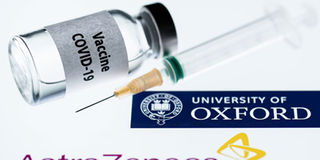Educate public soon enough on Covid-19 vaccinations

This file illustration picture taken in Paris on November 23, 2020 shows a syringe and a vial reading "COVID-19 Vaccine" next to AstraZeneca company and University of Oxford logos. Drugs company AstraZeneca and British Prime Minister Boris Johnson on January 28, 2021 defended the effectiveness of its Covid-19 vaccine after regulators in Germany said it should not be given to over 65s. PHOTO/AFP.
What you need to know:
- The issue: Covid-19
- Our view: Already the anti-Covid-19 vaccinations sentiments exist within our society and it is government’s role to make sure that Ugandans are educated early enough on the vaccine, its safety and benefits.
This week, government announced that it will procure 18 million doses of the Covid-19 vaccine. The Ministry of Health says the Astra Zeneca vaccine from Serum Institute of India will cater for nine million Ugandans, with each person taking two jabs.
These vaccines, expected in the country by April or May, will cater for persons aged 50 or above, those with underlying health conditions, health workers, security personnel and teachers, among other essential social service providers. Each dose will cost government $7 (about Shs25,000) which translates into $14 (about Shs51,000) per person.
The announcement comes on the heels of a launch of clinical trials for a locally-developed natural product, code-named UBV-01N, for treatment of Covid-19, viral and bacterial infections. Whereas this is a welcome move to combat the pandemic that has infected close to 40,000 Ugandans and claimed the lives of 327 others, getting a vaccine into the country is just the beginning of a very daunting task.
According to experts, conspiracy theories and mistrust have contributed to scepticism about Covid-19 vaccines in African countries, posing potential dangers to future immunisation campaigns. One of the wide-held beliefs being pushed by these theorists is that the Covid-19 vaccines are designed to reduce Africa’s population.
Among this category of anti-vaccine campaigners are religious leaders and politicians. Tanzanian president John Pombe Magufuli has been one of the lead crusaders, calling the vaccines against Covid-19 “dangerous”.
The anti-vaccine sentiment, often fed by rumours spread on social media, is also thriving in the West. Public attitudes towards vaccination can be split into three categories. First, there are people who have been persuaded of the merits of vaccination. Second, there are dogmatic anti-vaxxers, or people opposed to vaccination. And the third are those who are undecided.
A report by the Centre for Countering Digital Hate released in October last year says 31 million people follow anti-vaccine groups on Facebook, with 17 million people subscribing to similar accounts on YouTube.
If government is to successfully carry out the Covid-19 vaccinations, it needs to start by educating the public on the vaccines and their benefits. If the 2019 immunisation exercise against measles, rubella and polio are anything to go by, the role of sensitisation cannot be overlooked. Whereas government at the time threatened individuals circulating allegations that the vaccines were not okay with arrests and prosecution, it did not stop the scepticism of the process.
Already the anti-Covid-19 vaccinations sentiments exist within our society and it is government’s role to make sure that Ugandans are educated early enough on the vaccine, its safety and benefits. Otherwise, it risks facing resistance from the masses.
[email protected]




